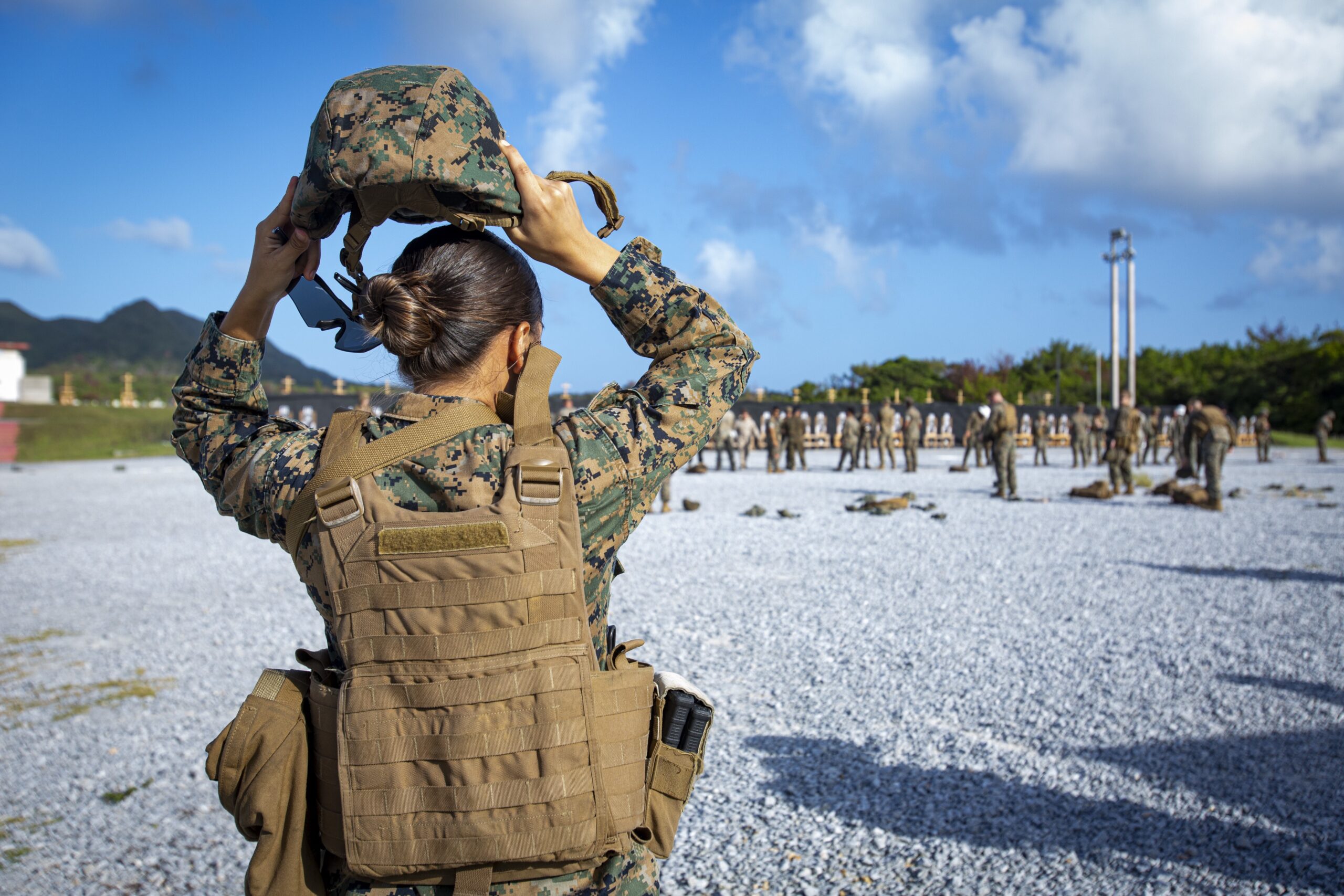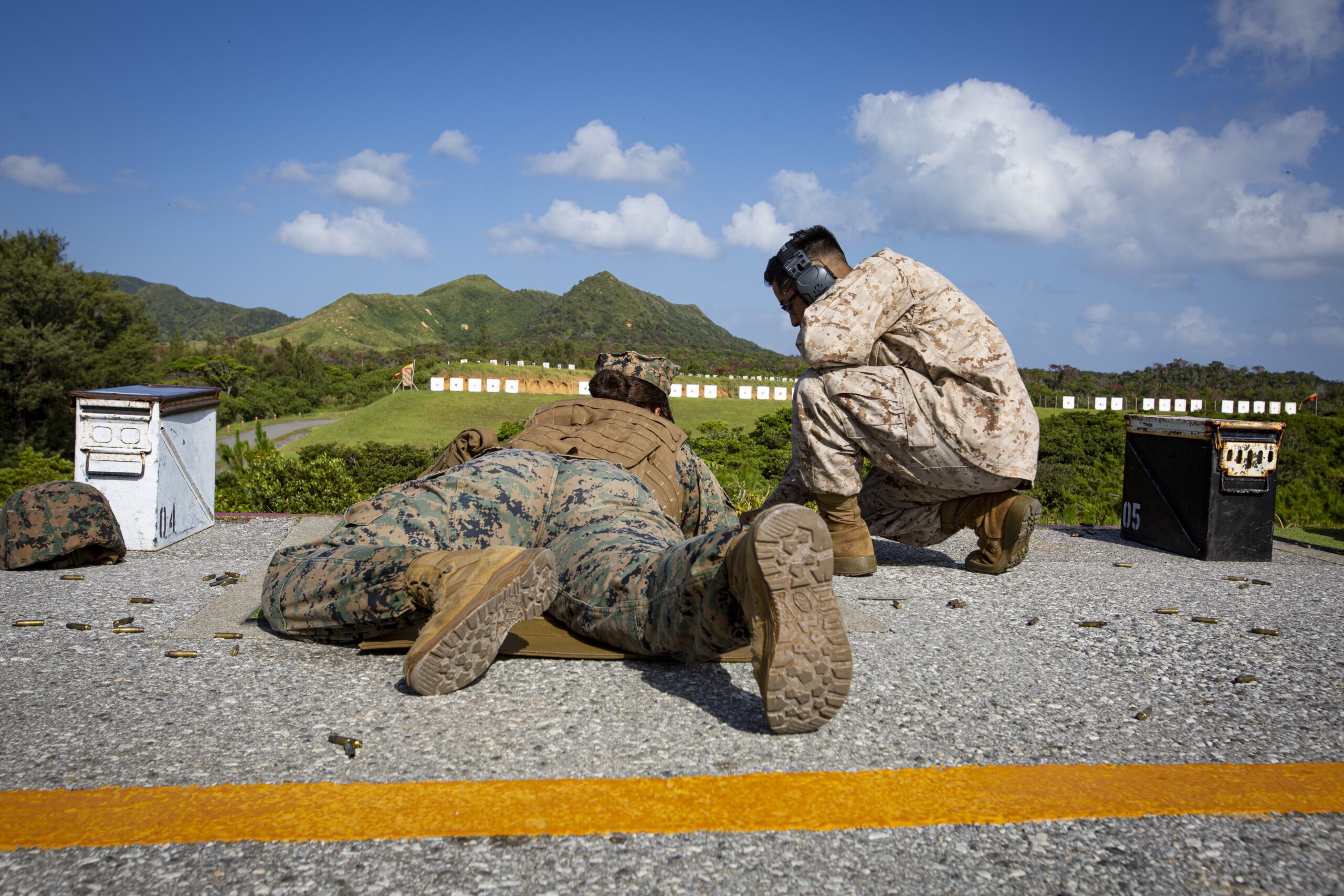
OKINAWA, Japan —
U.S. Marines across Okinawa participated in the new Annual Rifle Qualification from Oct. 4-8. This consisted of a three-day course of fire that tests Marines’ marksmanship skills in a dynamic-shooting environment.
The intent of ARQ is to provide an enhanced combat centric evaluation that uses a lethality based scoring system with more realistic standards. Shooters utilize artificial support to engage moving targets both while on foot and remaining stationary.
Day one
The day began with heightened nerves and rigid composures. However, not for battlesight zero, but for what was to occur in the days to come. These Marines were the first on the island to shoot the new ARQ course of fire.
“When I first heard about the range changing, I was concerned,” said Sgt. Morelia Capuchino Diaz, a food service specialist with Camp Courtney Mess Hall, Combat Logistics Regiment 37. “I wasn’t sure what to expect.”
She expressed that she came to the range really nervous. She knew the course of fire was going to be more difficult and physically demanding due to moving while shooting in full gear. Overall, it was unfamiliar for everyone and that meant all of the Marines needed to work side-by-side to conduct the range in a timely and proper manner.
What changed?
The Marines still shoot at the 500, 300, 200, 25 and 15-yard line, however, major adjustments were made. A few changes include: static engagement of stationary and moving targets, barricades for weapon stabilization, on the move engagements of static targets, and an adjusted scoring system.
“It’s more combat oriented and combat effective to train this way,” said Staff Sgt. Kaleb Bill, a marksmanship school house staff noncommissioned officer with Marine Corps Installations Pacific, Marine Corps Base Camp Butler’s Formal Marksmanship Training Center. “It also judges Marines based on their lethality as opposed to precision style shooting.”
Shooting this new course of fire allows Marines to make their own judgements and think critically. In a combat situation, while the fundamentals still apply, they may need to determine how to utilize the materials they are given by themselves.
The preparatory period of instruction has also been adjusted with the new rifle qualification. Grass week, a scheduled time Marines use to practice marksmanship fundamentals, is now a command dictated event. There is no longer a formal requirement to attend a grass week. However, it is still strongly encouraged by range personnel to participate in these preparatory classes.
“It’s more combat oriented and combat effective to train this way.”
Staff Sgt. Kaleb Bill
Marksmanship school house SNCO
“It is highly, highly recommended that you attend,” said Bill. “I strongly encourage all commanders to enforce grass week to ultimately prepare the Marines for the new ARQ. I can’t stress it enough. It may not be a requirement, but conduct the grass week, the preparatory training and issue out range books to your Marines.”
Day two
The second day of the range was the first time the Marines officially shot the new rifle qualification course of fire. Each shooter had an opportunity to run through the course of fire and ask the coaches as many questions as they needed. It was communicated to them to use the time allotted to completely understand the drills and ask for help.
As the day progressed, Capuchino expressed that she started to understand the course of fire a little better, however, there was still a clear adjustment period to work through.
“At first I was a little off because it was something new, especially the failure to stop – going from the pelvis to now the head and also applying a lot of individual headshots,” she said. “I felt way more confident once I realized we had a lot of opportunities for each drill to get at least one destroy for each.”
A ‘destroy’ is a zone on a target where the shots must impact to be counted. Additionally, failure to stop drill used to consist of shooting into the chest and pelvis zone. However, now the drill has transitioned to chest and head shots only.
The hardest part was time management during the second day, says Capuchino. The Marines were still learning and had not fully grasped the time hacks and how long it would take to shoot which she expresses was very stressful.
Day three: Prequalification
“The third day I was more confident, but was still learning the course of fire,” said Capuchino. “Even though it was a little intimidating, the challenge of it made me want to succeed. It is something new and as Marines say, we need to adapt and overcome.”
Capuchino explains that she’s always enjoyed a challenge, especially as a competitive person. With a wide smile, she continues to say she and her friends have always tried to compete and beat each other’s rifle scores. Fortunately for her, Capuchino has been a strong shooter since recruit training and sees this range as an opportunity to challenge herself and mentor her junior Marines about the new rifle qualification.
“My favorite part about the range is you get to make decisions on your own,” said Capuchino. “Even though it’s a different range, we still use the fundamentals we were previously taught. Now it’s just more high-tempo and you have to think fast. Like during the barricade drills, you have eight seconds to get a controlled pair. So you’re standing and you have seconds to get into position, aim right, take those rounds and get up.”
Day four
Day four was originally slated for qualification day, however, due to inclement weather the Marines were unable to finish and had to continue shooting on the fifth day.

Despite shooting through rain and wind, Capuchino was doing better than ever.
“At this point I already knew where all my holds were at and all I had to do was get used to applying all the fundamentals faster,” she said. “I was nervous, but I ended up getting all three ‘yes’ for qual due to good coaching and sufficient.”
While shooting at the 25 and 15-yard line, a ‘yes’ means that the Marine gets all of their shots for that drill in the destroy zone.
Day five: Qualification
“The last day I was confident and knew what to expect,” she said. “I was ready to shoot my best, and I ended up getting higher than I expected.”
The range was finally complete and Capuchino finished with an expert score. Achieving this score was a significant accomplishment to her because of her initial intimidation of the new course and the values she holds of leading from the front with an expert score.
“Especially now as you get higher up in rank, you need to set the example for your junior Marines,” she said. “I try to do well so my Marines see that I am trying, and then hopefully that helps instill that motivation to continue to improve themselves despite a challenge. As a leader, it’s now our role to tell them our mistakes and give advice on what they should and shouldn’t do so it can help set them up for success.”
Despite the inclement weather, success reached Capuchino and other shooters on the range. Every Marine finished with a qualifying score, which to range staffs’ knowledge, this was the first time there were no unqualified Marines.
“After shooting this new ARQ, I can tell that I like this range, and it is better than the last,” said Capuchino. “I prefer this new course of fire because it goes back to that combat mindset and is combat oriented. As you are shooting, take into consideration that the chances of going into combat are always there. It’s important to take what we learn here and apply that knowledge if ever needed. Remember, train as you fight.”
By Cpl Karis Mattingly

